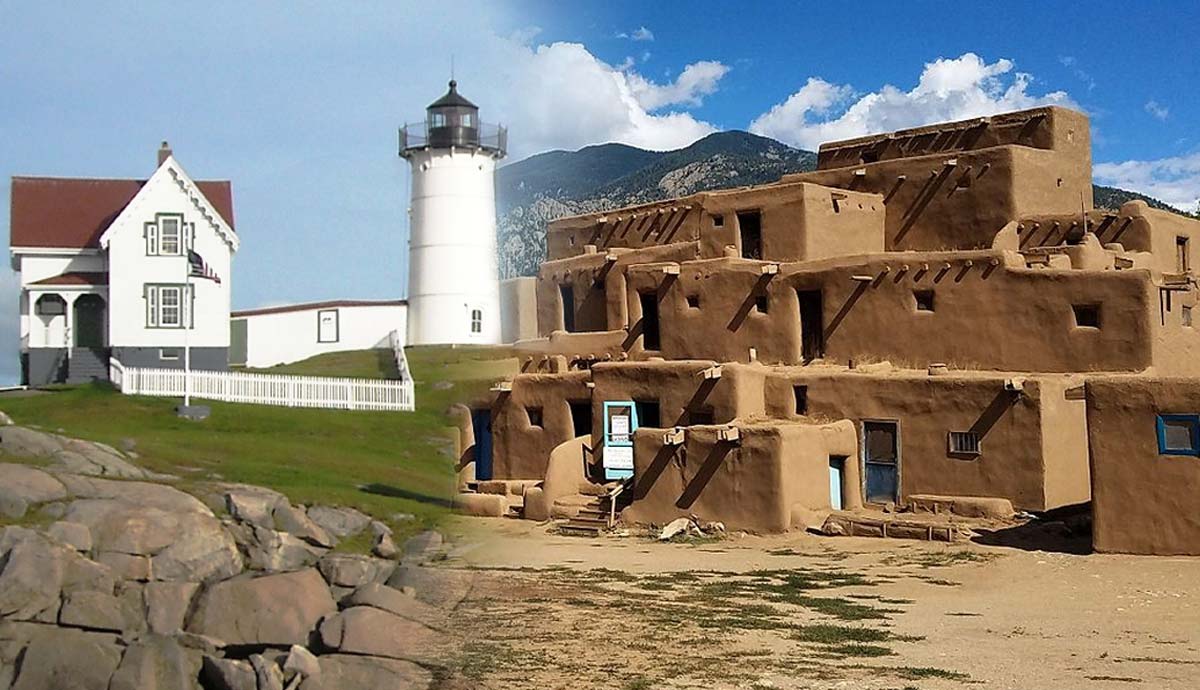
To properly explore America’s rich history, you will need to step off the beaten path and explore small towns that still hold echoes of the past. Beyond the bustling cities, you’ll find hidden gems, places where history lovers can genuinely get to learn about the fabric of the nation’s story. Each of the towns we’ve listed in this piece has a rich historical past and will transport you back in time, where you’ll be able to see America’s heritage and beauty. From colonial settlements to former mining boomtowns and quaint villages, read on to discover 10 U.S. historic towns that are worth adding to your bucket list.
1. Jonesborough, Tennessee

Founded in 1779, the oldest town in Tennessee is definitely a hidden gem for any history aficionado. Jonesborough preserves stories of frontier grit and Appalachian heritage and has been nicknamed the “Storytelling Capital of the World.”
You will enjoy strolling the brick-paved streets of this charming town, where you’ll feel like stepping into a time capsule. While visiting, you will have a chance to witness colorful buildings dating back to the 18th century that line Main Street.
However, it’s much more than picturesque charm when it comes to Jonesborough. In the early 1800s, more specifically, in 1820, this historic town became home to The Emancipator, the first newspaper in America that fought exclusively for the abolition of slavery. This fight for abolition is one of Jonesborough’s most notable contributions to history.
Whenever you visit this beautiful Tennessee town, make sure to head to Chester Inn Museum, which was known as a hub for local political discussions. As for the Old Jonesborough Courthouse, it further illustrates the town’s role as a center of community life and regional governance. And don’t forget to visit the International Storytelling Center, which showcases the town’s ongoing tradition of preserving history through oral storytelling. The center hosts events that attract visitors from all around the globe.
2. Taos, New Mexico

This town has a rich history that offers you a glimpse into the artistic as well as cultural heritage of America’s Southwest. It was founded in 1615 and has been a meeting ground for Native American, Anglo, and Spanish cultures for around four centuries.
The Taos Pueblo, a UNESCO World Heritage Site and National Historic Landmark is the centerpiece of the historical narrative of Taos. This adobe settlement was continuously inhabited for over 1,000 years. It showcases a way of life that persisted through centuries of change. In fact, the Taos Pueblo is a testament to the resilience and heritage of the Taos people. Make sure to tour the multi-story structures when visiting this iconic monument. You’ll also learn about traditional crafts here and gain insight into a community that predates European settlement.
Other historic landmarks worth visiting in Taos include the Kit Carson Home and Museum, the 18th-century San Francisco de Asis Mission Church, and the Taos Art Colony, on top of the multiple vibrant galleries and museums in town.
3. Wickford, Rhode Island

This small coastal village was established in 1709, so it has a rich historical legacy dating back to the early colonial period. Wickford houses one of New England’s best-preserved collections of colonial as well as Federal-period architecture. This makes it a top destination for those interested in exploring the area’s maritime past and history enthusiasts in general.
The historic harbor of the village has served since the 17th century as a vital port. This site is a must-see when visiting Wickford. Also, when you head to the waterfront, you’ll be able to witness how it’s lined with beautifully restored 18th and 19th-century homes. Many of these were once owned by sea captains and merchants. These same buildings that have stood for over two centuries house today antique shops, local boutiques, and plenty of galleries.
Key historical sites you need to visit when in Wickford include the Old Narragansett Church, which was built in 1707 and is New England’s oldest Episcopal church building. Also, a significant landmark to see is Smith’s Castle, built in 1678 on the site of Roger Williams’ trading post.
4. Berkeley Springs, West Virginia

On top of being a small town with colonial history and natural beauty, Berkeley Springs is also known for its long-standing tradition as a wellness destination. When it was established in 1776, the town was known as Bath. This name is reminiscent of the famous English spa town. It then quickly became America’s first spa resort.
The centerpiece of this West Virginia town is Berkeley Springs State Park. This is where, for centuries, natural mineral springs attracted countless visitors, including George Washington. The President used to frequent the area for its reputed healing properties.
Built in 1815, the historic Roman Bath House in Berkeley Springs still offers, up to this day, therapeutic baths. This provides a direct link to the early days of the town when it was a popular retreat for colonial elites. The Museum of the Berkeley Springs is located nearby and provides a glimpse of the town’s rich history and its development as a wellness center, as well as its role in the early settlement of the region.
Another interesting thing to know is that Berkeley Springs is home to one of America’s smallest state parks, the Berkeley Springs State Park, with a compact size of about 4 acres. Here, you can see the original stone bathhouse foundations. You can also dip your feet in George Washington’s Bathtub. This natural rock basin serves as a quirky reminder of Berkeley Springs’ unique appeal.
5. Jerome, Arizona

The unique history and stunning scenery of this former mining boomtown turned artistic enclave continue to fascinate visitors up to the present day. Known as the “Wickedest Town in the West,” Jerome was founded in 1876. It became one of America’s richest copper mining towns. At its peak, the town was a thriving community with a population of 15,000. However, after the mines closed in the 1950s, Jerome became nearly a ghost town.
As a history lover, the first thing you need to do when you’re in town is to explore the Jerome State Historic Park. The latter is home to Douglas Mansion which showcases mining artifacts as well as the fascinating history of the town. You also have to visit the Gold King Mine Museum, which offers a glimpse into the daily life of miners. As for the Jerome Sliding Jail, this is also a site worth seeing. This jail had moved 200 feet downhill because of land shifts, so it speaks to the geological challenges of the area.
6. Carmel-by-the-Sea, California

This coastal gem fascinates with its European-style village atmosphere as well as its artistic heritage. 1902 was the year when Carmel was founded, after which it quickly attracted writers, artists, and intellectuals. They all sought inspiration from its vibrant creative community and stunning natural beauty.
One of the most notable residents of Carmel-by-the-Sea was poet Robinson Jeffers. His stone home, known as Tor House, still stands until today as a symbol of Carmel’s literary past.
Carmel Mission Basilica should be on top of your list as a history enthusiast whenever visiting this beautiful California small town. The basilica was established in 1771 by Father Junípero Serra. It is considered one of the state’s most beautiful and well-preserved Spanish missions. Carmel Mission Basilica has also played a significant role in the early development of the region and stands as a testament to California’s colonial past.
While wandering in town, you’ll also have the chance to see plenty of fairytale cottages, hidden passageways, and historic inns. Carmel-by-the-Sea is, in fact, an architectural treasure trove.
7. Micanopy, Florida

This small Floridian town is known as the oldest inland settlement in the state. Micanopy is named after a prominent Seminole leader called Chief Micanopy. It was founded in 1821 and played a significant role in the Second Seminole War. The well-preserved 19th-century architecture of the town showcases its rich past. Micanopy’s charming streets are also lined with moss-draped oak trees that are a gem to marvel at.
If you’re in town, make sure to visit first the Micanopy Historical Society Museum. It showcases artifacts and stories from the early days of the town as a trading post. The museum also highlights the development of Micanopy into a Southern agricultural hub. The Herlong Mansion, an 1845 beautifully restored home, stands as a symbol of the antebellum heritage of the town. The historic Micanopy Cemetery is located nearby and contains graves that date back to the early 1800s.
8. York, Maine

This is one of New England’s oldest towns. It has more than 380 years of history, and it’s famous for its coastal charm. York was founded in 1630 and was originally settled as Agamenticus. After that, it was incorporated as York. This made it one of the first English settlements north of Massachusetts. York’s early colonial history is marked by its role as a trading center. This history is also reflected through its resilience during conflicts such as King Philip’s War.
York is full of iconic landmarks that appeal to history junkies. The Old York Historical Society oversees several well-preserved landmarks. This includes the Old Gaol, which was built in 1719. This is one of America’s oldest surviving jails. If you want to learn about York’s maritime post, then the best place to head to is the John Hancock Wharf and Warehouse. And for a taste of 18th-century life, check out the Emerson-Wilcox House. To see colonial-era buildings, head to the picturesque Old York Village. It’s located near the York River. Don’t forget about the picturesque Nubble Lighthouse (Cape Neddick Light), which sits on a rocky island just off York’s coast. This lighthouse was built in 1879.
9. Beaufort, North Carolina

The rich history of this picturesque coastal town dates back to the year it was founded, 1709. This is the third-oldest town in North Carolina, and it was a key port during colonial times. Beaufort has a storied maritime legacy that still captivates visitors up to this day. The town’s history is intertwined with tales of pirates, including the infamous Blackbeard, whose flagship, Queen Anne’s Revenge, was discovered just off its coast.
Start by exploring the Beaufort Historic Site. This preserved area features 18th and 19th-century homes, a jail, and a courthouse. As for the Old Burying Ground, it was established in the 1700s. This is another must-see. It features weathered tombstones that will provide you with intriguing stories of seafarers and settlers.
Make sure also to visit the waterfront at Beaufort. It’s lined with historic buildings showcasing the maritime heritage of the town. The North Carolina Maritime Museum houses artifacts from pirate lore and shipwrecks, so it’s also recommended to history buffs.
10. Chagrin Falls, Ohio

This historic village in Ohio is known for its 19th-century charm. It was founded in 1833 and built around its namesake waterfall on the Chagrin River. The latter served as a power source for the mills and factories that spurred its early growth. The town was an industrial hub in its early days, where it became a center for manufacturing wooden products. It attracted entrepreneurs and craftsmen during that time.
The beautifully preserved Chagrin Falls Historic District is definitely the first thing to explore when visiting this picturesque town. The district features Victorian-style homes, unique shops housed in restored 19th-century buildings, and brick-paved sidewalks. The beauty of Chagrin Falls’ small-town appeal is further illustrated by the iconic 1875-built Chagrin Falls Popcorn Shop.
It goes without saying that the picturesque waterfall which you’ll see in the center of town is the main highlight of Chagrin Falls, and it reflects the village’s connection to its industrial past.










